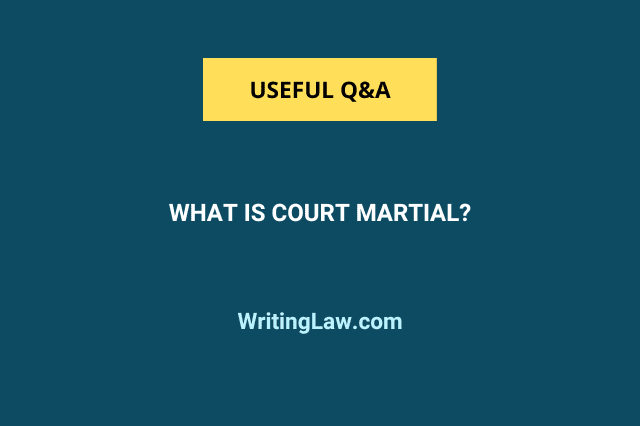
Court martial is a known word, but people usually fail to understand its true meaning. It creates fear in the minds of those working in military services. So, in this law note, we will understand the term court martial in detail and when it is used.
What Is Court Martial?
A court martial is a military court that functions like an ordinary civil court, but only the personnel working in the armed forces are tried in this court.
Moreover, the work of this court is to initiate proceedings and punish the individual found violating the decorum of the armed forces or guilty of any other such offence. All the proceedings in this court take place as per military law.
Furthermore, there are 70 crimes under military law for which the armed forces personnel can be tried under this court.
It is to be noted that matters such as rape, murder, and suicide are tried under civil courts, and the military also investigates such matters at their level.
Four Types of Court Martial in India
Let’s study them one by one.
1. General Court Martial (GCM)
Everyone — from the soldier to the officer, can be punished, and the panel consists of 5 to 7 members apart from the judge. This court can give punishment up to life imprisonment or death.
2. District Court Martial (DCM)
Every personnel, starting from the soldier to the Junior Commissioned Officer (JCO) level, can be punished under this court, and the panel consists of 2 or 3 members. Moreover, the panel has the provision to give imprisonment for a term of two years.
3. Summary General Court Martial (SGCM)
In this, the court martial punishes only those officers who commit any crime in the region of Jammu and Kashmir.
4. Summary Court Martial (SCM)
This court martial tries the personnel ranking from soldier to non-commission officers (NCO), and the offenders can be imprisoned for two years.
Court Martial Process
These are the steps that need to be followed in the court of inquiry against the officer who is found guilty:
- If the soldier is found guilty, then he can be punished immediately.
- If the case is big (that is, it’s of a grievous nature), it is transferred to a summary of evidence.
- The summary of evidence investigates the matter, and on finding relevant evidence, the summary of evidence can provide immediate punishment or recommend the proceeding to court martial.
- Any case can be tried in front of the court martial only after the summary of evidence recommends the case.
- The guilty person is given the right to appoint his or her lawyer.
- Furthermore, only the President can provide relaxation to the offender under Article 72 of the Indian Constitution.
- The court martial decision can be appealed before the Armed Forces Tribunal.
- Moreover, the decision or the judgment of the Armed Forces Tribunal can be appealed in the High Court.
Conclusion
The court martial has the same powers as that of a civil court. Moreover, the court martial can punish the guilty person by imprisonment or death sentence as deemed necessary. Furthermore, the court martial can also suspend or terminate the officer if found guilty, or the allowances such as pension or other future benefits can be taken away.
Read Next: Can a Police Officer Arrest a Soldier in India?
- 13 Characteristics of a Company Under the Companies Act - 5th March 2024
- Lee vs Lee’s Air Farming Ltd – Case Explained - 5th March 2024
- Relevant Facts Under the Indian Evidence Act - 14th January 2024







